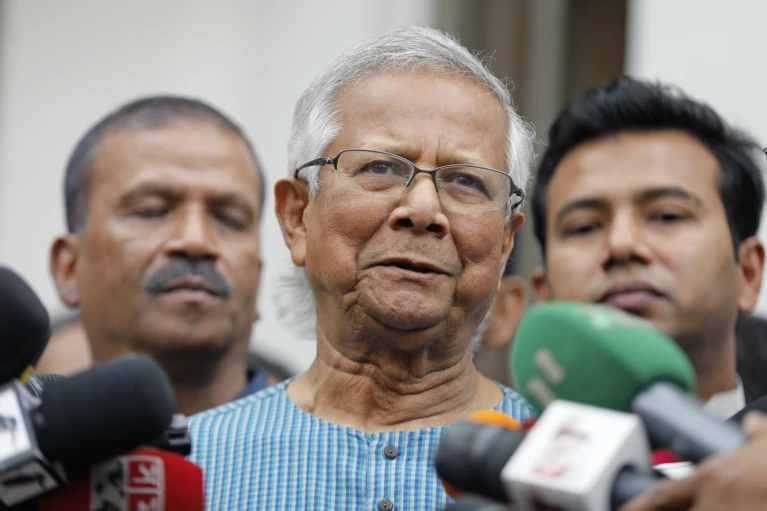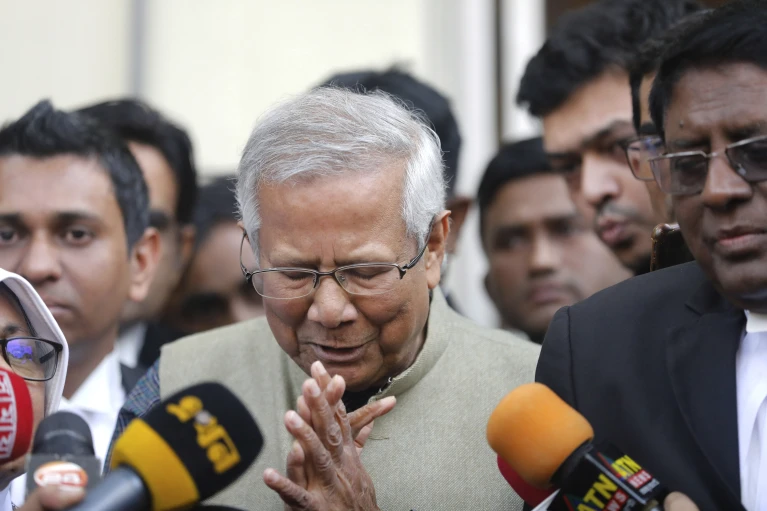
Who is Muhammad Yunus, the Nobel Peace Prize laureate set to lead Bangladesh’s interim government?
On August 8, 2024 by editor1 StandardDHAKA, Bangladesh (AP) — Nobel Peace Prize laureate Muhammad Yunus has been appointed to lead Bangladesh’s interim government following the resignation and departure of Prime Minister Sheikh Hasina amid widespread protests against her administration.
Known for his work with the Grameen Bank and as a prominent critic of Hasina, Yunus will serve as caretaker prime minister until new elections can be held. This decision was made after a meeting late Tuesday that included student protest leaders, military officials, civil society representatives, and business figures.
Hasina’s resignation came after weeks of protests over a controversial government job quota system evolved into broader dissent against her 15-year rule, which, despite economic growth, was criticized for increasing authoritarianism.
Bangladesh is now facing a political crisis with the military temporarily assuming control. The role of the military in the interim government remains uncertain after the president dissolved Parliament on Tuesday to facilitate the formation of a new government and the scheduling of elections.

Yunus, who is currently in Paris advising the Olympics organizers, was proposed by student leaders who spearheaded the protests. While Yunus could not be reached for comment, student leader Nahid Islam confirmed that Yunus agreed to assume the role during their discussions. Yunus, aged 83, is a well-known critic and former political opponent of Hasina.
Yunus referred to Hasina’s resignation as the country’s “second liberation day,” while Hasina had previously criticized him as a “bloodsucker.”
Yunus, an economist and banker, received the Nobel Peace Prize in 2006 for his pioneering work in microcredit through Grameen Bank, which he founded in 1983 to provide small loans to impoverished entrepreneurs, especially women. The Nobel Committee recognized Yunus and Grameen Bank for their efforts to foster economic and social development from the grassroots level.
Tensions between Yunus and Hasina began in 2008 when her administration initiated investigations into Yunus and Grameen Bank. Yunus had announced plans to form a political party in 2007, but did not follow through. During these investigations, Hasina accused Yunus of using coercive methods to recover loans from poor women, which Yunus denied.

In 2011, Hasina’s government began scrutinizing Grameen Bank, leading to Yunus’s dismissal as managing director for alleged violations of retirement regulations. In 2013, Yunus faced trial on charges related to receiving money without government authorization, including his Nobel Prize funds and book royalties. Additional charges were later brought against him concerning other ventures, including Grameen Telecom. In 2023, Yunus and 13 others were indicted on charges related to a $2 million embezzlement case, which Yunus denies.
Supporters argue that Yunus has been unfairly targeted due to his strained relationship with Hasina.
Born in 1940 in Chittagong, Bangladesh, Yunus earned his PhD from Vanderbilt University and briefly taught there before returning to Bangladesh. In a 2004 interview with The Associated Press, Yunus described the moment he decided to establish Grameen Bank after meeting a poor woman struggling with debt despite making beautiful bamboo stools.
___
Saaliq reported from New Delhi.
You may also like
Archives
Calendar
| M | T | W | T | F | S | S |
|---|---|---|---|---|---|---|
| 1 | ||||||
| 2 | 3 | 4 | 5 | 6 | 7 | 8 |
| 9 | 10 | 11 | 12 | 13 | 14 | 15 |
| 16 | 17 | 18 | 19 | 20 | 21 | 22 |
| 23 | 24 | 25 | 26 | 27 | 28 | 29 |
| 30 | ||||||
Leave a Reply